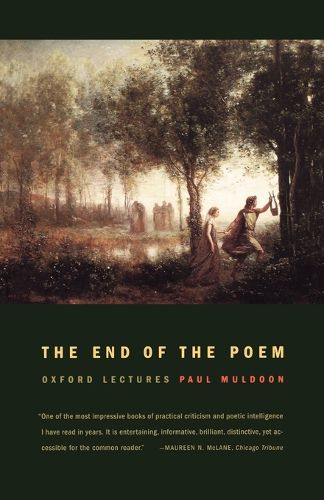Readings Newsletter
Become a Readings Member to make your shopping experience even easier.
Sign in or sign up for free!
You’re not far away from qualifying for FREE standard shipping within Australia
You’ve qualified for FREE standard shipping within Australia
The cart is loading…






In The End of the Poem, Paul Muldoon dazzlingly explores a diverse group of poems, from Yeats’s All Souls’ Night to Stevie Smith’s I Remember to Fernando Pessoa’s Autopsychography. Muldoon reminds us that the word poem comes, via French, from the Latin and Greek: a thing made or created. He asks: Can a poem ever be a free-standing structure, or must it always interface with the whole of its author’s bibliography–and biography? Muldoon explores the boundlessness created by influence, what Robert Frost meant when he insisted that the way to read a poem in prose or verse is in the light of all the other poems ever written.
Finally, Muldoon returns to the most fruitful, and fraught, aspect of the phrase the end of the poem : the interpretation that centers on the aim or function of a poem, and the question of whether or not the end of the poem is the beginning of criticism. Irreverent and deeply learned, The End of the Poem is a vigorous approach to looking at poetry anew.
$9.00 standard shipping within Australia
FREE standard shipping within Australia for orders over $100.00
Express & International shipping calculated at checkout
In The End of the Poem, Paul Muldoon dazzlingly explores a diverse group of poems, from Yeats’s All Souls’ Night to Stevie Smith’s I Remember to Fernando Pessoa’s Autopsychography. Muldoon reminds us that the word poem comes, via French, from the Latin and Greek: a thing made or created. He asks: Can a poem ever be a free-standing structure, or must it always interface with the whole of its author’s bibliography–and biography? Muldoon explores the boundlessness created by influence, what Robert Frost meant when he insisted that the way to read a poem in prose or verse is in the light of all the other poems ever written.
Finally, Muldoon returns to the most fruitful, and fraught, aspect of the phrase the end of the poem : the interpretation that centers on the aim or function of a poem, and the question of whether or not the end of the poem is the beginning of criticism. Irreverent and deeply learned, The End of the Poem is a vigorous approach to looking at poetry anew.